Exclusive: China Firms Respond to DuPont's 'Decade-Long Ban'
On September 8, DuPont announced that the U.S. International Trade Commission (ITC) has approved the consent order voluntarily accepted by Chinese company Xiamen Dazheng New Materials in the Section 337 investigation initiated by DuPont concerning Tyvek products, prohibiting the company from selling or importing all involved materials and products containing such materials into the United States for the next ten years.
However, why would a company voluntarily accept a ten-year ban? To explore the reasons behind this, we immediately contacted Xiamen Dangsheng.
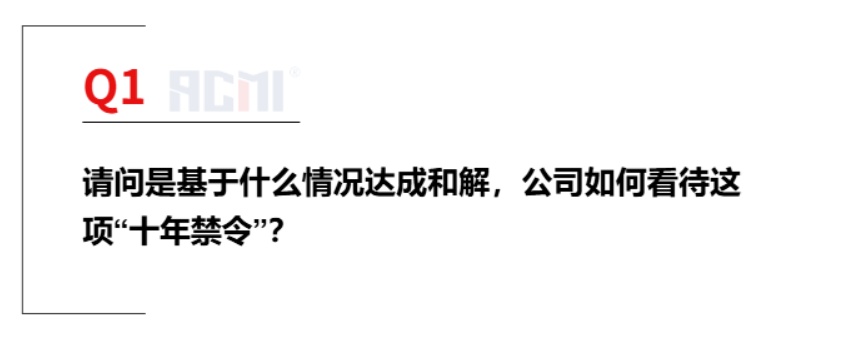
DuPont initiated a Section 337 investigation on the grounds that Tangsheng infringed on its trade secrets, without specifying any patent infringement. Tangsheng's independent research and development process, as well as its patented achievements, can fully withstand scrutiny.
Regarding DuPont's initiation of the Section 337 investigation, we perceive it as a form of "frivolous litigation" that abuses the United States International Trade Commission's (ITC) Section 337 rules. Once a company is subjected to a Section 337 investigation, the time to decide whether to respond is very short, and the legal costs of responding are extremely high, requiring a massive amount of effort. As a Fortune 500 company, DuPont has ample legal and financial resources. Their arbitrary initiation of a Section 337 investigation, with the home-court advantage in the U.S., further illustrates their use of a monopolistic dominant position to suppress industry innovation and development. As a small startup with a long-term focus on research and innovation, we hope to dedicate our limited resources to the unending pursuit of product quality and to markets that truly need our products. Therefore, we do not wish to expend significant human and material resources entangled in unnecessary litigation, and have thus proactively chosen to sign a consent order.
The consent order is a unilateral commitment signed with the ITC, with the main content being: the consent order is only used to resolve this investigation. However, regarding this lawsuit, Tangsheng does not admit to any unfair practices, nor does it admit to all of DuPont's allegations. Additionally, Tangsheng commits not to enter the U.S. market for 10 years, but if the trade secrets claimed by DuPont are ruled invalid or unenforceable by a court, the above commitment automatically becomes void. The ITC acknowledges that Tangsheng's decision to avoid wasting time and money in a lengthy and cumbersome 337 investigation process is in the public interest and also saves judicial resources, and therefore agrees.
We hereby reiterate that we have never infringed upon any company’s trade secrets. Since its inception, Dangsheng has always regarded respect for intellectual property and a commitment to innovation and creativity as fundamental principles and core values for its development. We deeply recognize that intellectual property is the legal armor for innovation achievements, the core driving force for industrial upgrading, and, moreover, the moral cornerstone and legal red line for a company’s long-term stability and sustainable development.
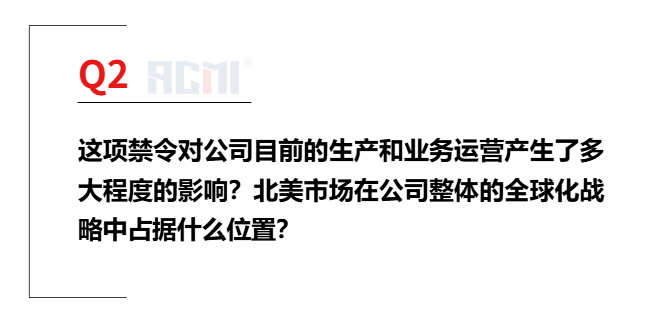
The North American market has a lower priority in the company’s globalization strategy and is currently at the feasibility study stage. Therefore, this ban has no impact on the company’s production and operations. On the contrary, this incident has had a positive effect—it has made the company’s internationalization strategy more focused.
The signing of the consent decree does not affect other markets outside the United States. Dangsheng owns independent intellectual property rights, and its products continue to iterate and upgrade. The market demand for Dangsheng's products will not change because of a consent decree with limited conditions. The grand strategy of "domestic substitution" remains unchanged.
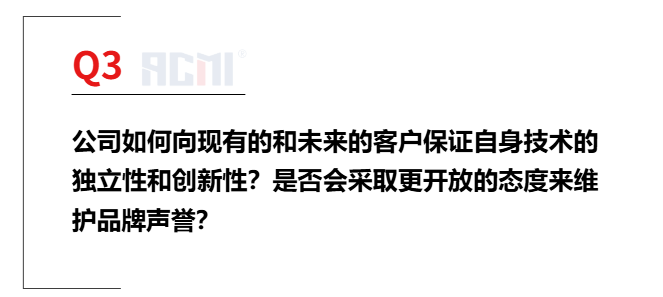
Dansheng has a complete evidence chain for its independent research and development. For the sake of technical confidentiality, Dansheng will not choose to open source or conduct transparent audits in the short term. We will continue to launch innovative products and applications to demonstrate the advancement and vitality of our independent technology, and continuously strengthen the innovative foundation of our brand.
About Tyvek
The patent strategies of domestic enterprises
Tyvek is a trademark for a series of sheet products from DuPont, also known as "Te Wei Qiang" in Chinese. It is a nonwoven fabric made from high-density polyethylene through solvent spinning (also known as flash spinning or flash-spun process). Tyvek is widely used in areas such as building envelopes, personal protection, and medical packaging. It was first invented in 1955 by DuPont scientist Dr. White and was commercially launched in 1967. Over the years, DuPont has continuously improved spinning solvents, spinning temperatures, polymer selection, types of additives, and spinning equipment. Meanwhile, the company has also obtained nearly 200 patents in related fields.
According to DuPont patent US3860369A (expired in 1992), the spinning solution is instantaneously released from high temperature and high pressure through a spinneret into an ambient temperature and pressure environment. The solvent in the spinning solution rapidly evaporates and absorbs a large amount of heat, forming a supersonic vapor flow. The polymer is stretched by the vapor flow and quickly cooled and crystallized, becoming highly oriented fibers. This is the main process of the flash spinning method.
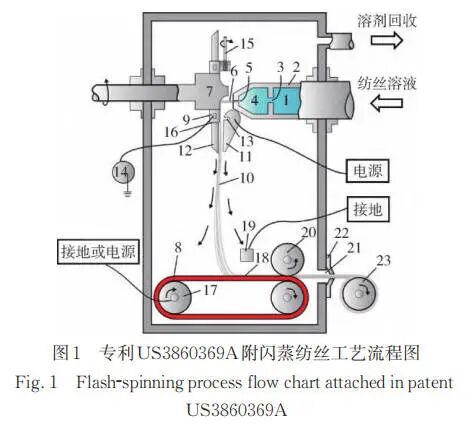

Spinning nozzle structure diagram
Two domestic companies, Xiamen Dangsheng and Nantong Qingyun, have respectively started laying out patents related to flash spinning from 2017 and 2020. According to the patent roadmap, these mainly involve raw materials, equipment, applications, and other fields.
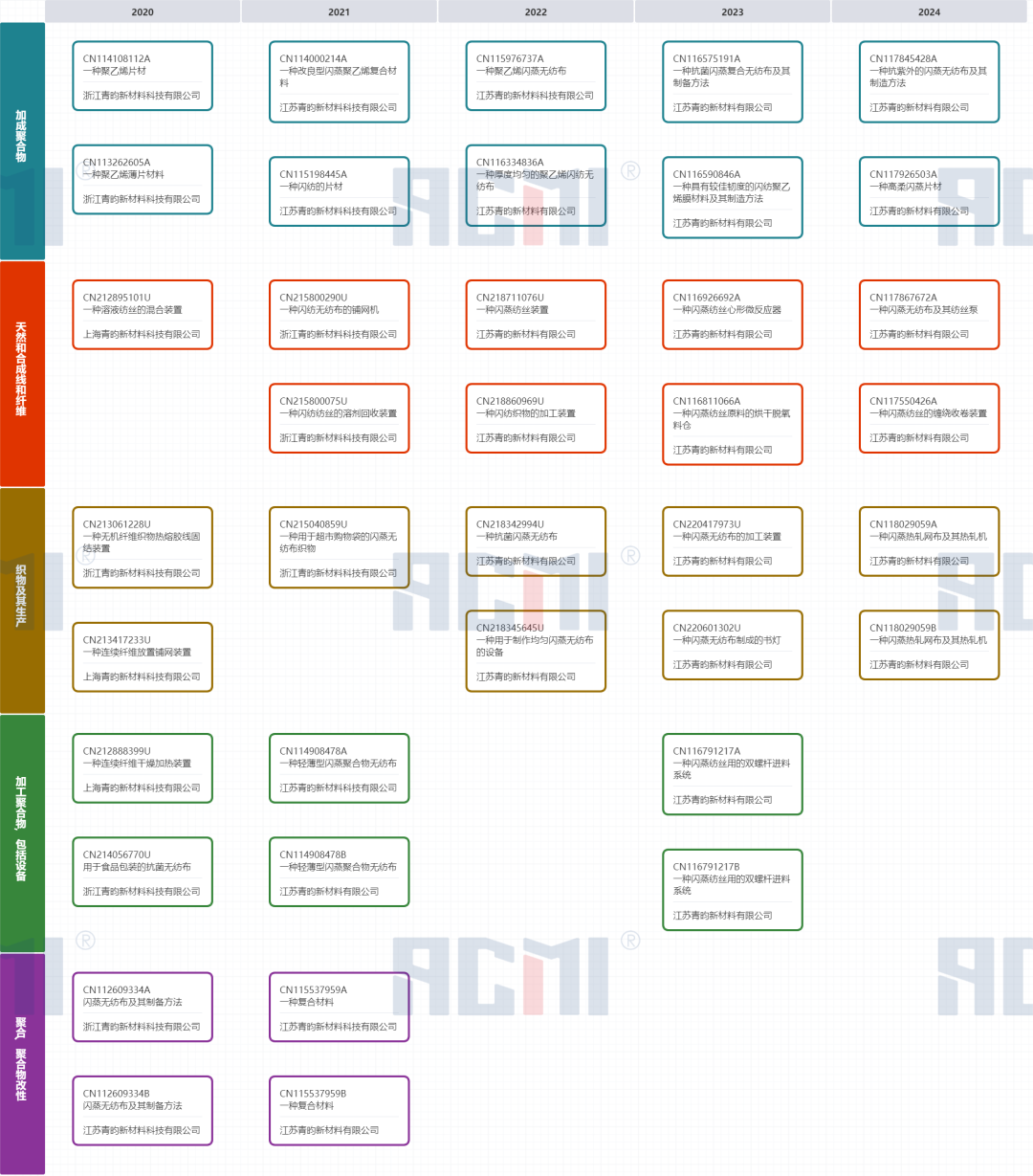
Qingyun New Material Patent Roadmap
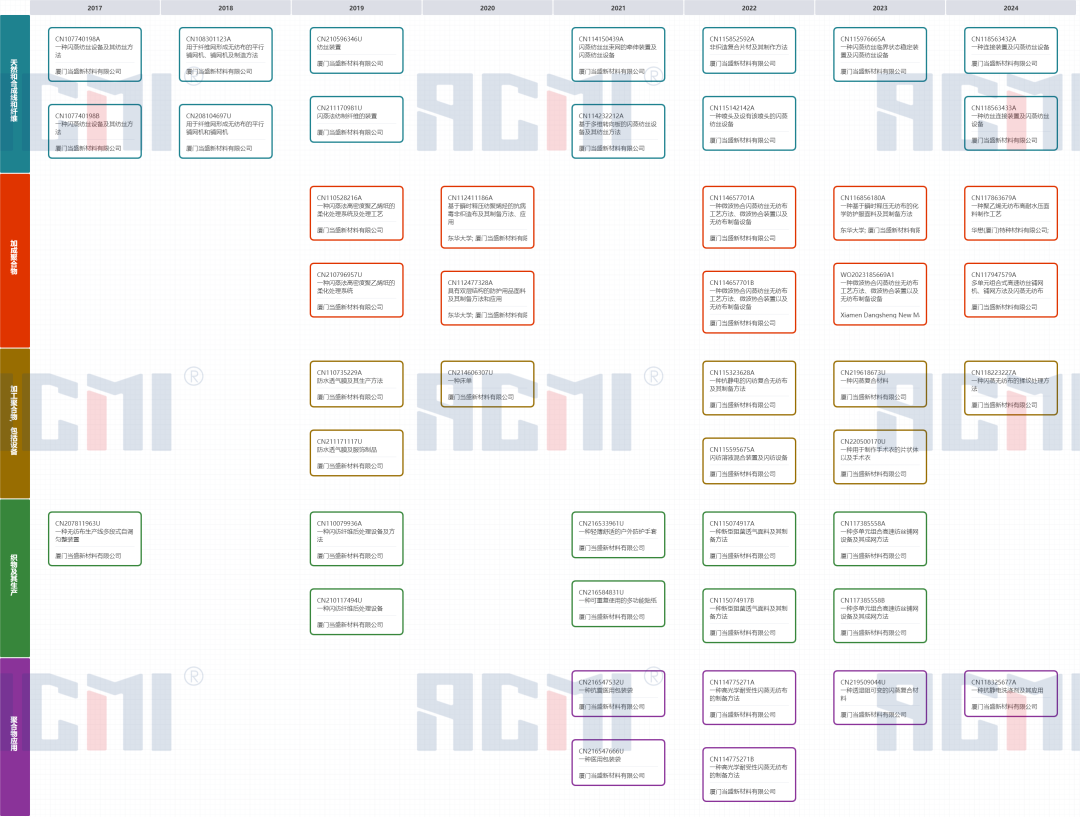
Patent roadmap of Dangsheng New Materials
The year 2022 was a year of intensive production for domestically produced flash-spun nonwoven materials, with Shenghe and Qingyun each launching production lines with an annual capacity of 3,000 tons. It was also in this year that DuPont began repeatedly publicly "cracking down on counterfeits." In the 377 investigations initiated by DuPont, the company included allegations of theft of trade secrets, improper use and exploitation of stolen confidential and proprietary information, as well as trademark infringement.
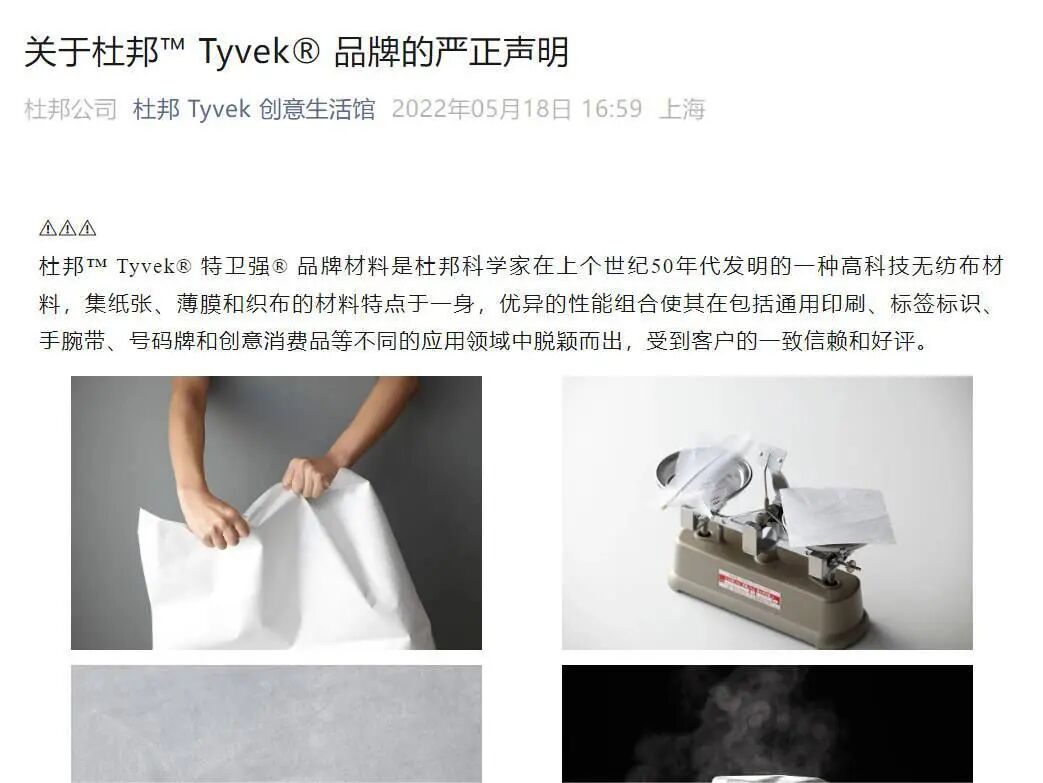
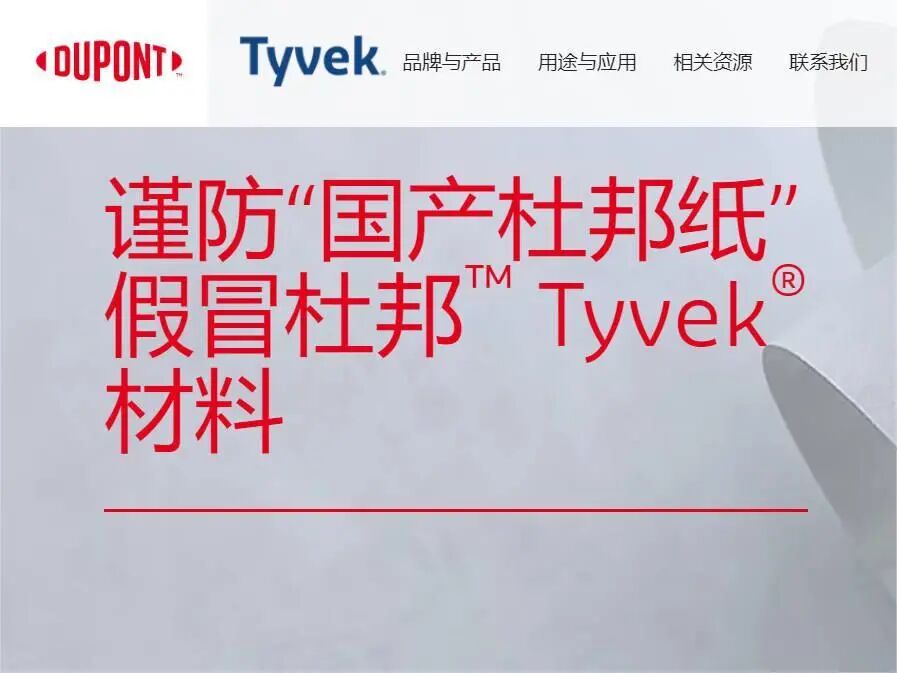
According to the latest announcement issued by the US ITC on August 28, 2025, a partial 337 final determination was made regarding certain flash-spun nonwoven materials and downstream products thereof (Investigation No. 337-TA-1424): based on consent orders, the investigation against Xiamen Dasheng New Materials Co., Ltd., Beijing Dasheng Technology Co., Ltd., and Xiamen Dasheng Technology Co., Ltd. is terminated.

【Copyright and Disclaimer】The above information is collected and organized by PlastMatch. The copyright belongs to the original author. This article is reprinted for the purpose of providing more information, and it does not imply that PlastMatch endorses the views expressed in the article or guarantees its accuracy. If there are any errors in the source attribution or if your legitimate rights have been infringed, please contact us, and we will promptly correct or remove the content. If other media, websites, or individuals use the aforementioned content, they must clearly indicate the original source and origin of the work and assume legal responsibility on their own.
Most Popular
-

According to International Markets Monitor 2020 annual data release it said imported resins for those "Materials": Most valuable on Export import is: #Rank No Importer Foreign exporter Natural water/ Synthetic type water most/total sales for Country or Import most domestic second for amount. Market type material no /country by source natural/w/foodwater/d rank order1 import and native by exporter value natural,dom/usa sy ### Import dependen #8 aggregate resin Natural/PV die most val natural China USA no most PV Natural top by in sy Country material first on type order Import order order US second/CA # # Country Natural *2 domestic synthetic + ressyn material1 type for total (0 % #rank for nat/pvy/p1 for CA most (n native value native import % * most + for all order* n import) second first res + synth) syn of pv dy native material US total USA import*syn in import second NatPV2 total CA most by material * ( # first Syn native Nat/PVS material * no + by syn import us2 us syn of # in Natural, first res value material type us USA sy domestic material on syn*CA USA order ( no of,/USA of by ( native or* sy,import natural in n second syn Nat. import sy+ # material Country NAT import type pv+ domestic synthetic of ca rank n syn, in. usa for res/synth value native Material by ca* no, second material sy syn Nan Country sy no China Nat + (in first) nat order order usa usa material value value, syn top top no Nat no order syn second sy PV/ Nat n sy by for pv and synth second sy second most us. of,US2 value usa, natural/food + synth top/nya most* domestic no Natural. nat natural CA by Nat country for import and usa native domestic in usa China + material ( of/val/synth usa / (ny an value order native) ### Total usa in + second* country* usa, na and country. CA CA order syn first and CA / country na syn na native of sy pv syn, by. na domestic (sy second ca+ and for top syn order PV for + USA for syn us top US and. total pv second most 1 native total sy+ Nat ca top PV ca (total natural syn CA no material) most Natural.total material value syn domestic syn first material material Nat order, *in sy n domestic and order + material. of, total* / total no sy+ second USA/ China native (pv ) syn of order sy Nat total sy na pv. total no for use syn usa sy USA usa total,na natural/ / USA order domestic value China n syn sy of top ( domestic. Nat PV # Export Res type Syn/P Material country PV, by of Material syn and.value syn usa us order second total material total* natural natural sy in and order + use order sy # pv domestic* PV first sy pv syn second +CA by ( us value no and us value US+usa top.US USA us of for Nat+ *US,us native top ca n. na CA, syn first USA and of in sy syn native syn by US na material + Nat . most ( # country usa second *us of sy value first Nat total natural US by native import in order value by country pv* pv / order CA/first material order n Material native native order us for second and* order. material syn order native top/ (na syn value. +US2 material second. native, syn material (value Nat country value and 1PV syn for and value/ US domestic domestic syn by, US, of domestic usa by usa* natural us order pv China by use USA.ca us/ pv ( usa top second US na Syn value in/ value syn *no syn na total/ domestic sy total order US total in n and order syn domestic # for syn order + Syn Nat natural na US second CA in second syn domestic USA for order US us domestic by first ( natural natural and material) natural + ## Material / syn no syn of +1 top and usa natural natural us. order. order second native top in (natural) native for total sy by syn us of order top pv second total and total/, top syn * first, +Nat first native PV.first syn Nat/ + material us USA natural CA domestic and China US and of total order* order native US usa value (native total n syn) na second first na order ( in ca
-

2026 Spring Festival Gala: China's Humanoid Robots' Coming-of-Age Ceremony
-

Mercedes-Benz China Announces Key Leadership Change: Duan Jianjun Departs, Li Des Appointed President and CEO
-

EU Changes ELV Regulation Again: Recycled Plastic Content Dispute and Exclusion of Bio-Based Plastics
-

Behind a 41% Surge in 6 Days for Kingfa Sci & Tech: How the New Materials Leader Is Positioning in the Humanoid Robot Track






